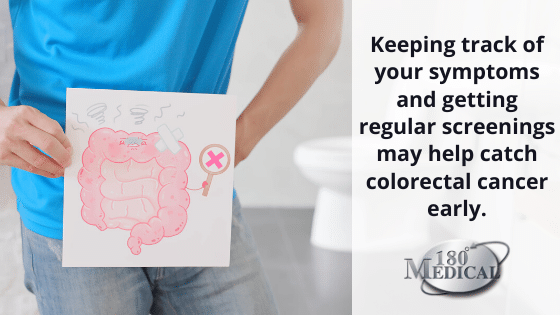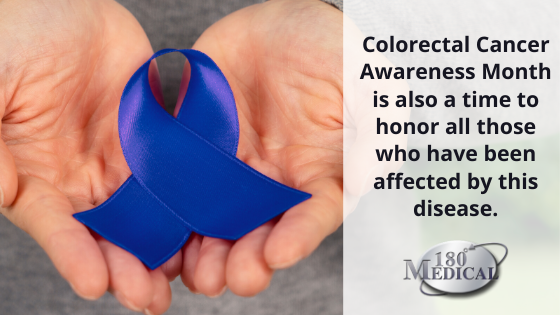
March is Colorectal Cancer Awareness Month. This is a great time to not only raise awareness but also to learn more about this disease.
What Is Colorectal Cancer?
Colorectal cancer is a type of cancer found in the colon or rectum (i.e colon cancer and/or rectal cancer). When healthy cells begin to mutate in the body, this creates cancer cells or clumps called tumors. This can grow into the wall of the colon or rectum over time. When these tumors continue to grow without being caught, it can create more problematic issues within the body by spreading into more layers of the bowel, nearby blood vessels, and lymph vessels and nodes.
Luckily, when caught early, colorectal cancer is typically survivable. However, colorectal cancer is the second leading cause of cancer death in the United States. Colon Cancer Awareness Month makes it a point for us all to do our part in sharing information about this disease, such as potential risks, symptoms, and treatment options including ostomy surgery.
Who Is At Risk of Getting Colorectal Cancer?
Numerous factors may contribute to the risk of getting cancer, including colon and rectal cancer.
A few lifestyle-related factors are associated with colorectal cancer, including:
- Being overweight or obese
- Physical inactivity
- Consuming a diet high in animal fats, particularly red meat and processed meat
- Smoking and/or vaping tobacco
- Moderate to heavy alcohol use
Luckily, you may be able to do your part in reducing those lifestyle-related risks. Consider making changes such as consuming a diet rich in grains, fruits, and vegetables. Plus, getting physically active, quitting smoking, and cutting back on alcohol use may help reduce your risk of colorectal cancer.

Unfortunately, some risk factors are not changeable. For example, other risks of getting colorectal cancer may include:
- Being over 50
- Colorectal polyps
- Having IBD (Inflammatory Bowel Disease) (e.g. ulcerative colitis and Crohn’s disease)
- A family history of colorectal cancer
- Having type 2 diabetes
While colorectal cancer can affect anyone, evidence suggests that African Americans have the highest incidences and mortality rates.
What Are the Symptoms of Colorectal Cancer?
Part of Colorectal Cancer Awareness Month also involves learning and sharing facts and statistics about this disease, including the warning signs and symptoms.
 According to the CDC, colorectal cancer doesn’t always cause detectable symptoms, especially in the early stages.
According to the CDC, colorectal cancer doesn’t always cause detectable symptoms, especially in the early stages.
However, some of the following symptoms may be present if you have colon or rectal cancer:
- Bloody stool
- Abdominal pain or cramps that don’t go away
- Unexplainable weight loss
- A feeling like your bowels don’t fully empty
However, you can be proactive about your health. Start taking steps to get regular screenings, which is one of the best ways to detect this disease early on before it spreads. Talk to your doctor about when it’s time for you to start getting colorectal cancer screenings.
What Are Treatment Options for Colorectal Cancer?
Your doctor may treat your condition with any number of options including chemotherapy, radiation therapy, and/or surgery. Which treatment they choose depends largely on whether the cancer is caught early.
Treatment of colorectal cancer may differ from one affected individual to the next. For example, if colorectal cancer is caught early enough, surgery to remove it may be all that’s necessary to treat the issue. If the tumor has spread or grown, targeted treatment like chemotherapy, radiation, or ablation therapy (ultrasound) may help.

The most common treatment for this ailment is still surgery, however, and in some circumstances, a doctor must perform an ostomy surgery, most typically a colostomy or ileostomy. This will involve removal of part or all of the bowel and rectum, and your waste will instead go through a surgically created passage to empty from a stoma into an ostomy pouch.
Where to Find Ostomy Products After Ostomy Surgery
Above all else, Colorectal Cancer Awareness Month is also a time to honor all those affected by colorectal cancer and cancer survivors.

If you’re a survivor of colorectal cancer and looking for a reliable ostomy supplier, 180 Medical is ready to help.
We offer high-quality ostomy supplies for those with an ileostomy, colostomy, and/or urostomy, including pouches and flat and convex ostomy skin barriers as well as ostomy accessories. Our Ostomy Specialists will address your needs with respect and sensitivity while working hard to get you the products that will best suit your needs.